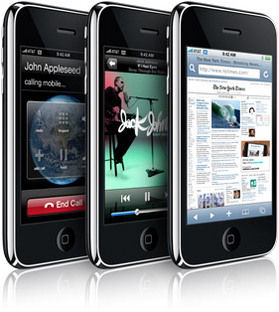Three years from now, it is likely that globally there will be close to 2 billion yes, BILLION smart mobile devices, out-selling computers, according to Yankee Group estimates. Nielsen reports that over half of mobile phones being activated now in the US are smartphones. IDC estimates 182 billion (yes, BILLION) annual app downloads by 2015. Flurry estimates that smart phone owners spend more time on apps than PC owners spend on the internet from their computers.
Smartphones, tablets, iPod touch will create the mobile, app-enabled lifestyle and that means apps. Why? Because mobile is not like a computer with a small screen; it is transformational. Apps provide needed simplicity for mobile web access by extracting the essence of a service and put it right in front of the user, in a way that fits perfectly within the screen limitations and adds a localized dimension. For example, search for Walmart on your computer now do that on your Smartphone. Locations near your current location will be mapped and, if you click the link, you will get to a very app-like landing page rather than the one you see on your computer. Search for eBay and the app itself shows up in the results. They have optimized nicely for mobile search and perhaps that has something to do with their pronouncement that nearly $2 billion in gross sales were generated via mobile in 2010. On the other hand, many grocery retailers are not yet optimized for mobile and you have to do the pinch and stretch thing to be able to read the website you get to, and then, only to find that the coupons need to be printed!
If there is any life activity that is crying out to become appified, simplified, localized and mobilized on your smart phone, it is shopping. Furthermore, marketers want it too. Imagine; you will be able to deliver messages and offers to a shopper as they stand right in front of your brand and its competitors that are customized from prior purchase activity. This is behavioral targeting and recency, two principles of media placement, on steroids.
Look at this distribution of time spent on apps by category from Flurry; it appears that aiding shopping has not yet taken off.
- Games: 47%
- Social: 32%
- News: 9%
- Entertainment: 7%
- Other: 5%
However, app developers are starting to work on this. Modiv has been testing a mobile shopping solution called Scan It with Stop and Shop that is now about to be tested on iPhones. It links offers to your frequent shopper history and knows where you are in the store.
Ad Age reports Finish Line unveiled a new app that is focused on shopper experience; it gives shoppers access to real-time inventory at the store nearest them. Users can check to see if an item is available in the style, size and color they’re looking for before coming to the store.
Amazon offers a price checking app so you can be in a Best Buy or Walmart, check the price of the same item at Amazon and decide if you want to order it from within the app. Making a purchase at Amazon while standing in the Walmart “showroom”!
Truly it is the “rise of the planet of the apps”! As an increasing majority obtains smart mobility, as smart phones replace PCs as the number one way of accessing the internet, as life becomes app-enabled, people will insist, “yeah, we want an app for that”…and they’ll get it.
In app-enabled lifestyles, marketers will see transformational opportunities to connect consumers and shoppers with their brand. They will optimize their owned media for mobile. They will see new mobile ad units that are very impactful, and vertically integrate their relationship with consumers from the living room to the store, becoming relevant at the right time, right place, with the right message.
I’ll share more of my thoughts on the app-enabled lifestyle on Nov 30-Dec 1 at the SF Appnation III conference.


The NPD Group has just given me some additional data. 58% of phones bought (they measure purchases) were smartphones as of Q2, 2011. In the US, Android has over a 50% market share, with Apple also gaining some share. Blackberry is losing big time, down to 11% share.
[…] a special arrangement, presented here for discussion is an excerpt from a current article from the Joel Rubinson on Marketing Research […]